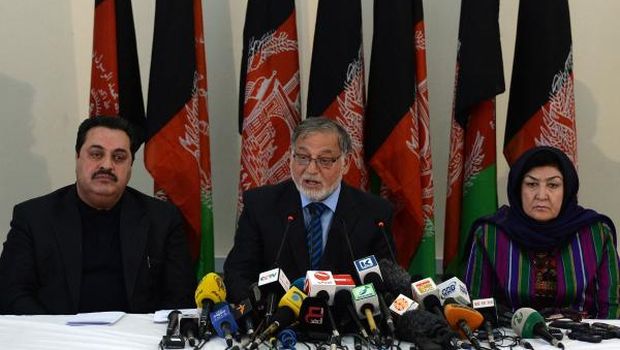
Head of the Afghan Independent Election Commission (IEC) Ahmad Yousuf Nuristani, center, speaks during a press conference in Kabul on May 15,2014. (AFP Photo/Wakil Koshar)
Kabul, Reuters—Preliminary results from Afghanistan’s presidential election, due to be announced on Wednesday, have been delayed, the head of the election commission said, amid accusations of fraud that threaten to split the fragile country along ethnic lines.
Votes from around 2,000 polling stations in the June 14 run-off are to be reviewed and recounted, Ahmad Yousuf Nuristani, chairman of the Independent Election Commission (IEC), told a news conference.
The contest pitted former foreign minister Abdullah Abdullah against former World Bank economist Ashraf Ghani.
“Due to the review and recounting of votes from 1,930 polling stations in 30 provinces, the election commission has delayed the announcement of the preliminary result till next Monday to further assure transparency,” Nuristani said.
A senior UN official said the delay was intended to take account of allegations by Abdullah that his rival engaged in mass vote rigging.
Ghani’s aides, citing election observers, say he is in the lead in the run-off by one million votes. But official figures have not been released.
The election was intended to mark the first democratic transfer of power in Afghan history, a crucial step towards stability as NATO prepares to withdraw the bulk of its troops by the end of the year.
President Hamid Karzai’s office released a statement saying he had discussed the elections by telephone with US Secretary of State John Kerry.
“Both sides emphasized the importance of mutual respect for Afghanistan’s legal process, addressing and evaluating concerns of both candidates, finalization of the election process and the Afghan way of understanding between both presidential candidates,” the statement said.
The final phrase was interpreted by some as a reference to a possible power sharing deal between the two parties.
Now the UN fears the standoff between Abdullah, who draws his support from the minority Tajik community, and Ghani, a member of the Pashtun majority, could inflame long simmering ethnic tensions. The Pashtun are Afghanistan’s largest ethnic group and the Tajiks the second largest.
Abdullah has accused President Hamid Karzai, an ethnic Pashtun, of collusion in the alleged rigging. Last week, thousands of Abdullah supporters marched on the presidential palace.
Abdullah’s campaign has also released audio recordings purporting to show senior officials discussing stuffing ballot boxes. His aides say that turnout for the run-off in some Pashtun areas was three times higher than in the first round.
On Tuesday, both candidates met UN officials and Western diplomats who are trying to help resolve the deadlock.
“The meetings provided an opportunity to engage in discussions about election-related issues and the way forward,” a UN statement said.
Diplomats hope the delay will help the two sides agree on the appointment of new electoral officials, following the resignation of the head of the commission’s secretariat over fraud claims.
After the meeting, Ghani’s aides denounced delays in the count.
“The IEC results should be announced, so that the nation can move on to the adjudication of complaints,” they said in a statement.
“Altering the rules of the game, which all participants agreed to beforehand, in the middle of the process, will cause that process to have less legitimacy. People must keep their promises.”
Karzai’s successor faces a spike in violence as foreign troops draw down, as well as a brewing financial crisis and donors tired of rampant corruption.
The most pressing issue for the new president may be signing a bilateral deal with Washington to allow a small contingent of US troops to stay beyond 2014 for training and counter-terrorism operations.
Karzai has refused to sign, but both Abdullah and Ghani have promised to sign promptly if elected.
